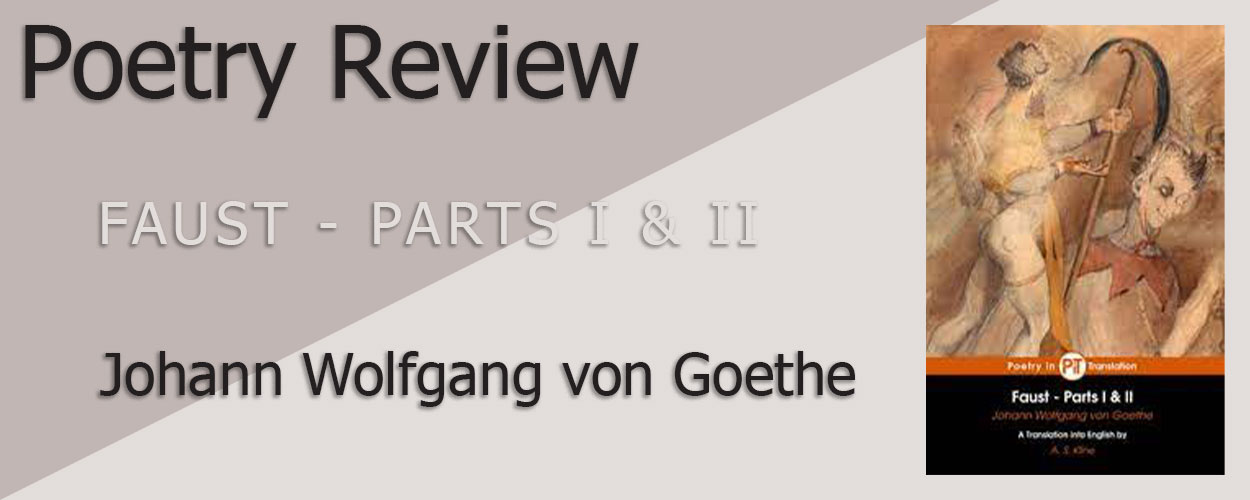

I liked it; wouldn't read again
My dad, though he isn’t a reader, recommended this book to me because of our German heritage. Goethe is the most well-known German writer, on par with William Shakespeare, and this is his most famous work. Plus, he and I share a hometown (which I thought was cool).
Read: January 15 – January 19, 2024
Genre: Classic, Literary Fiction, Poetry
Audience: General, Adult
Book contains: death, murder, religious bigotry, war, confinement, sexual content, violence, grief, abandonment, alcohol, child death
Purchase a copy from Amazon.ca
Heinrich Faust, a learned scholar, has achieved the highest levels of knowledge, but feels that none of his many achievements has provided him with a sense of fulfillment. He yearns to gain knowledge of absolute truth and the meaning of existence. After Faust then turns to magic, he encounters the devil, who makes him a deal. If the devil can give him one moment of true satisfaction in his life, he will allow his soul to be taken down to Hell.
I did not understand the bigger picture of this poem at all. I’ve said before that I’m not the biggest poetry buff, probably because my mind works better with absolutes than with abstracts, and this play/poem is almost entirely a metaphor. I later listened to a video essay on YouTube explaining the meaning and metaphor of Faust, but in the moment, I was completely clueless. (The video is called FAUST Explained: Goethe’s eulogy of the Enlightenment & its philosophical influence and is, like, three hours long, but you can check it out if you’re interested.)
Since this version was translated by A.S. Kline instead of Bayard Taylor, I couldn’t find an audiobook version to listen along to, as the changes in phrasing were too great. I had to read this book on my own, and I have to say, after so many pages of the rhyming lines, my thoughts started to have a swing of their own.
This story takes the form of a play but is written in poetic verse. Many of the lines follow a repeated rhythm and rhyming scheme, though there are parts of the book that don’t follow these conventions. Before the first act comes a prologue, in which a director and others are preparing to enact the play, so we get introduced to the idea as a whole.
Doctor Faust is a learned man, but he is still unhappy. He’s learned all he can and is celebrated by everyone around him, but he’s unsatisfied with life, so he turns to the devil, Mephistopheles, to provide that. If the devil can finally give him a sense of fulfillment, Faust agrees to hand over his immortal soul. From there, Mephistopheles begins giving him all the experiences of the world.
I’m sure the quality of this book is top notch. The translation from the original German was by A.S. Kline, one of two that I know of, but the English was well written. I was surprised and confused about how the rhyme scheme could be retained even after translation without changing the meaning of the words too much—I’m sure sacrifices needed to be made—but I was impressed all the same.
This was a really long poem. Like, really long. And it was certainly a long time for me to be confused. I’m sure for people who understand what’s going on more than just what happens in each scene, they’d enjoy it more and feel less of the drag of scene to scene that I did, but I was constantly confused and not very used to this style of writing, so it felt like it went on forever.
A lot of this flew over my head, even if I could understand most of what was happening in each scene. I’d recommend this book to people who want to experience a piece of history, are better versed in poetry than me (which isn’t hard) and who enjoy religious debate.
Inferno by Dante Alighieri
The Pin-Thief and the Sunflowers by Sofia Federova
*Maggot Dance by G.O. Kayode*
Faust by Johann Wolfgang von Goethe
*North Star Heart by Natasha Silva*
Embers: one Ojibway’s Meditations by Richard Wagamese
Beowulf by unknown
Tigerpetal Press is a small book press dedicated to publishing local authors and poets.